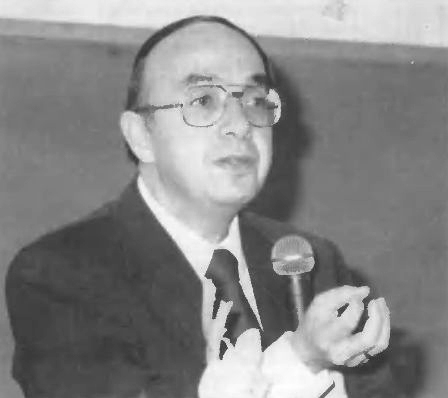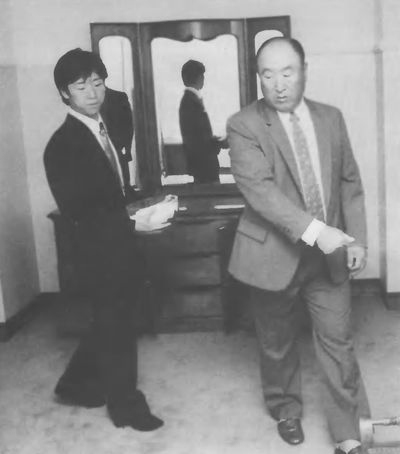![]()
The Words of the Durst Family
|
|
The Words of the Durst Family |

Dr.
Mose Durst
I'd like to begin by reading from Paul's letter to the Colossians:
Put on then, as God's chosen ones,
holy and beloved, compassion, kindness, lowliness, meekness, and
patience, forbearing one another and, if one has a complaint against
another, forgiving each other; as the Lord has forgiven you, so you
also must forgive. And above all these put on love, which binds
everything together in perfect harmony. And let the peace of Christ
rule in your hearts, to which indeed you were called in the one body.
And be thankful. Let the work of Christ dwell in you richly, teach
and admonish one another in all wisdom, and sing psalms and hymns and
spiritual songs with thankfulness in your hearts to God.
[Col
3:12-16]
God wants His people to be holy because He knows they ought to be like Him, for He is holy. The great theme of the Old Testament is that God is a holy God, a perfect, pure, and loving Parent. If we are created in His image, we indeed are called to be like Him: pure, good, innocent, and holy. When Paul, in the New Testament, teaches us to become new men and women, he urges us to put off the old--that which is profaned by the world--and take upon ourselves the life of holiness.
It is not easy to become holy. It does not come quickly, nor does it come without great effort. In a world that is neither pure nor holy, we face many obstacles on our way towards obtaining holiness. In Webster's Unabridged Dictionary, second edition, we find that the word holy means 'belonging to or coming from God; hallowed, consecrated, or set apart for sacred use; having a sacred character, such as a holy vessel or a holy word." Its second meaning is: "pure, free from sin, perfect in a moral sense." Under the word "holiness" we have the meaning: "the quality or state of being holy; purity or integrity of moral character, freedom from sin."
What we have here is both an external and an internal definition. You can take an object and set it apart so that it has meaning and value beyond the object itself, so that it has reference to God. For example, if we make an altar and prepare flowers for the altar, we prepare those flowers with the mind and heart to glorify God. For He has created the beauty with which we seek to acknowledge Him by setting that beauty apart and sanctifying it. The person who arranges flowers for the altar does not do it mechanically. The heart must be prepared in prayer; the flowers must be prepared in prayer.
Last year, I was present when Rev. Moon dedicated the new annex of the East Garden parsonage. What was the first thing he did at this dedication? He gathered all the brothers and sisters in front of the building and, with his family next to him, he offered the building to God in prayer, so that it might be used for His purpose. Then, as he does with every object he deals with, he went around the building and in each room he prayed and sprinkled holy salt, signifying that this building would be sanctified and set apart for God's use.
Whenever I bring an object into my house, I pray internally: "God, use this object for Your purpose. Make it sanctified." Then I put holy salt on the object. I also remind myself when I come into the house, "Lord, sanctify me and purify me, so that I can be worthy of living in Your house." Performing these simple gestures always moves me.
You may know that traditional Jewish people have a mezuzah on the front door of their house, a parchment in a canister with words from the Old Testament. When an Orthodox Jew walks into the house, he kisses the parchment, the word of God, thereby seeking to sanctify himself as he enters into the house of God. When I was a young person, studying in the synagogue, my rabbi would teach me to pick up the prayer book and kiss it, helping me to recognize that this was not just any book, but a holy book. Even today I would never put another book on top of the Bible. I have been made aware that things are sanctified according to their value, according to their use, and according to their purpose.
When I was studying in the synagogue, I learned from the Old Testament that God is indeed holy. Almost every reference to God says, as in Exodus 15:11, "Who is like unto thee, 0 Lord, among the gods? Who is like thee, glorious in holiness?" Psalm after psalm points out, "God sitteth upon the throne of His holiness," or "God hath spoken in His holiness," or "Thy testimonies are very sure: holiness becometh thine house, O Lord, forever." The prophet Isaiah talks about the future, and offers a vision of Israel: "A highway shall there be, and a way, and it shall be called the way of holiness; the unclean shall not pass over it." From the first Psalm to the last, there are only two ways to walk. To walk in the way of the Lord is the holy way--both internally and externally--for the external symbolizes the internal. It is not what we take in that makes us holy, but what comes from within. We each develop holiness by challenging our thoughts, our feelings, and our actions, which enables us to make rightful use of external objects.

Father
holy salts every room in East Garden on July 20, 1987.
In the New Testament the promise of God is the same promise of the Old Testament prophets. In Luke 1:75, Zechariah asks that we "might serve Him without fear in holiness and righteousness before Him all the days of our lives." Our challenge is to become holy like God. The Old Testament emphasizes that it is God who is holy, but the New Testament additionally emphasizes, as Paul teaches us, that we ourselves must take off the old and become new people in holiness and in righteousness. Jesus is, of course, referred to as the one who is the most holy.
Throughout the New Testament there is a contrast between holiness and filthiness. The New Testament writers, like the Old Testament writers, were very realistic about describing the ways of the world in contrast to the way of God. Paul's letters are letters that might appear in a daily newspaper, for he spoke to his readers--people of new faith in religious communities (such as ours)--quite honestly. He knew they had seen and tasted of the secular world, and he wanted them to realize the difference between the world and the holy realm that God represents.
Paul writes in II Corinthians 7:1, "Having therefore these promises, dearly beloved, let us cleanse ourselves from all filthiness of the flesh and spirit, perfecting holiness in the fear of God." Peter says, in I Peter 1:15, But as he who called you is holy, be holy yourselves in all your conduct; since it is written, 'You shall be holy, for I am holy."'
Herein lies the difficulty. We live with our body, we live with the objects we work with every day. We live in relationship with each other and we speak words to each other. How often can we honestly say that we indeed treat everything in our lives as holy--our body, our clothes, our environment, our words, our relationships?
I regularly counsel blessed couples in my office. They sometimes will speak words to each other that are not holy. I remind them that they do not possess each other. Both husband and wife are children of God, and they must not speak even one word that is not holy if theirs is to be a holy matrimony. What is a holy matrimony if we don't acknowledge and recognize the other person as the child of God? We must validate one another's holiness. One word to our brother or sister that is not spoken with the acknowledgement that this person is God's child is a profane word. Would you profane your life here on earth? Would you profane your own brother?
I often go to the homes of our brothers and sisters. I am sometimes shocked by the carelessness and thoughtlessness some people have for the objects in their rooms. Have you ever seen Rev. Moon's room? What do you see at East Garden? Every object on the table is clean and neat. Rev. Moon dresses carefully, even if he is in a casual shirt; he always looks as if he had just washed. Externally as well as internally, with Rev. Moon you always feel you are in the presence of someone holy. In the way he uses his hands and speaks to someone, he speaks representing God, who is holy, to someone else who is holy, or should be holy.
If I come into a member's home where things are thrown casually around, dirty •laundry is piled up on the side, and dirty dishes are in the sink, the first thing I feel is that this is not a holy place. No matter how much we might profess to be holy people, how holy are we if we surround ourselves with filth and disorderliness? If we say words to each other that hurt and are cold and unkind, how holy are we? If we look at each other with lust, how holy are we? If we look at each other with indifference, how holy are we? Even on a hot day, we should burn with a holy fire. Cardinal John Henry Newman often talks in his sermons about holiness. He describes how unpleasant it would be for an unholy person to be in heaven. It would be as unpleasant as someone coming to a church service who finds religion strange, for everything there would be extremely uncomfortable to him. Cardinal Newman writes:
Heaven would be hell for an unreligious man. We know how unhappy we are when we are alone in the midst of strangers who have different tastes and habits from ourselves. How miserable it would be, for example, to find ourselves in a foreign land, among people whose faces we never saw before, and whose language we cannot learn, because we haven't learned to love!
When we hear certain languages from people whose faces are different from ours, it still upsets us. When our teacher, Rev. Moon, says we have to learn the language of those people we don't like, it might upset us even more.
Imagine a man of earthly dispositions and tastes [writes Cardinal Newman] who is suddenly thrust into a society of saints and angels. How forlorn!, he wanders through the courts of heaven! He finds no one like himself. He sees in every direction the marks of God's holiness, people singing songs. How would he feel? "Why are they singing those holy songs over and over again?" He can no longer turn his thoughts in other ways because now his conscience reproaches him. He would feel that the eternal eye is ever upon him, that the eye of holiness, which is joy and light, perceives him with an eye of wrath and punishment. God cannot change His nature. Holy He must be forever. While He is holy, no unholy soul can be happy in heaven.

Father,
accompanied by Hyo Jin Nim, holy salts every room in the new East
Garden manor on July 20, 1987.
It is actually very difficult to hear Rev. Moon's sermons. I find it even more difficult to sit with him at the breakfast table. It's very uncomfortable for me, because I am immediately aware of all my shortcomings and how unholy I am. It's a challenge being around him because you always feel poked and provoked. "Why doesn't he act like me? Why doesn't he have the radio blasting at the breakfast table?" It's because he wants the atmosphere to be holy. His holiness is there whenever I am there. It's uncomfortable, but I can't escape.
The difficulty with holiness is that it does take a great deal of time to be holy. We can pray, come out of Sunday service inspired, and walk out of the building--and in three minutes we need another Sunday service. Or our central figure may ask us to sit in a meeting and discuss God's work. It goes on for 10 hours. We have to go through what might seem to us to be the most boring agenda and we don't like it; we would rather go for a walk. But it has to be done; we are there to accomplish something important.
Holiness takes a long time. That's why we speak of restoration as taking not just one lifetime, but three lifetimes. In Rev. Moon's first speech in God's Will and the World, "Restoration and Blessing" (February 2, 1968), we read that restoration will take not just one generation. One generation perhaps will make the turn and then two generations are needed to turn everything back around. Time, effort, habit, discipline, and practice are the hallmarks of the spiritual life. Why do we have to attend sermons every day? Do you know that almost every one of the parables of Jesus says essentially the same thing? Why did he have to say the same things over and over? For the whole time the disciples were around him, they kept forgetting. Jesus must have said, "Don't you remember what I said the Kingdom was like? I'll tell you another story. Sit down." We have to awaken ourselves and awaken each other. Every day we have to find a new way to say, "I love you." That's why our spiritual life is so difficult. Every day we have to work at loving the people we don't like. I've been working on some people for 15 years, at least! And every day I wonder, "Lord, are You sure You want me to do this?" And every day the Lord gives the same answer, "What do you think I've been telling you? Get out there and love them, whether you like it or not." Every day we have to work at becoming holy. Every time our thoughts wander off, we have to start praying, "The Lord is my shepherd. I shall not want..."
Why do you think every religion develops rituals through which people can become holy? Because every religion is aware of the fallen state of the human being. In this world, everything moves us to be unholy. Women provoke and seduce men by their dress on the street. Men look with eyes of lust. Walk down the street and you can hear hundreds of times words of filth coming from people's lips. We glut ourselves with the pleasures of the world, but we are as empty as a wasteland when it comes to holiness. Therefore, we need to pray, to sing hymns, and to memorize holy verse. The hardest thing in life is to become holy, because so much of our life is spent on things of the world. The challenge of our life, of the life of any religious person, is to become holy. God was holy, He is holy, and He will be holy. He will not change. Therefore, we must become like Him.
A sister came in to see me this week and said, "If only my central figure would speak to me in a certain way, I could respond with love. But since he doesn't, I can't respond to him." I said, "Why do you complicate things by making a qualification? If your central figure hates you, just respond with love and win his heart. If he ignores you, just respond with love and win his heart. If he loves you, all you can do is respond with love." If we sing every moment a love song to God, we become holy. If we think every moment about how we can make the objects in our room holy, we become holy. If the words we speak even to the people who hate us are loving words, then we become holy. The ultimate holiness is the holiness of love.
If we look honestly at ourselves, especially while praying, we are aware of our unholiness. Therefore, through repentance we must come back to God and ask God to purify us so that we can be holy. Jesus said, "Blessed are the pure in heart, for they shall know God. Blessed are those who act with purity of heart, for they shall become God's children." God is holy, and as we are pure, innocent, simple, humble, loving human beings, we too can become like God. That is a challenging offer to a profane human. But that is the challenge of our life.